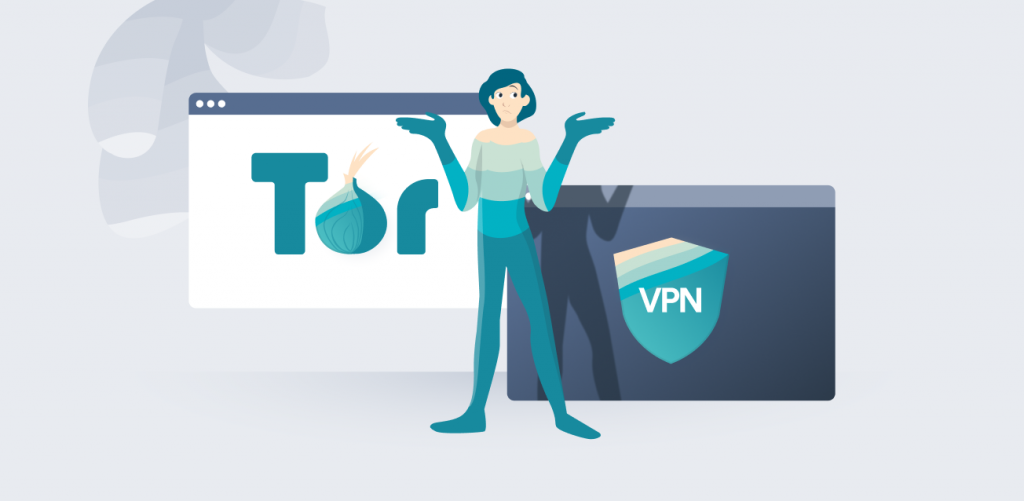Have you ever wondered what the difference is between Tor and VPN? If so, you’ve come to the right place! In this blog post, we’ll discuss what makes Tor and VPN different from each other, and why you might want to use both together.
Tor (The Onion Router) is a free and open-source software designed to protect your privacy on the internet. It works by routing your internet traffic through a series of nodes in a distributed network, making it difficult to trace back to the originator. This means that you can browse the web anonymously without your ISP or other third party being able to see what websites you’re visiting.
A VPN (Virtual Private Network) is also designed to protect your privacy on the internet. It works by encrypting all of your data before it leaves your device and sending it through an intermediary server located in another country. This means that anyone who intercepts your data will not be able to read it as it has been encrypted. Additionally, because your IP address is hidden behind the server’s IP address, websites will not be able to track or identify your location.
So why would you want to use Tor and VPN together? Well, there are several benefits:
1) Increased security: By using both Tor and a VPN together, you can further protect yourself from malicious actors who may try to snoop on your connection. As mentioned previously, Tor routes your traffic through multiple nodes which makes it difficult for an attacker to track where the traffic originated from. A VPN adds an extra layer of encryption which makes it even more difficult for someone trying to access data being sent over a public network.
2) Accessing restricted content: Depending on where you live, there may be certain websites that are blocked or censored due to local laws or regulations. By using a combination of Tor and a VPN, you can access restricted content without having any of your activity logged or tracked by anyone monitoring the network.
3) Anonymity: Using both Tor and a VPN together ensures that no one will be able to identify who is accessing certain websites or services online. This is especially useful if you need an extra layer of anonymity when accessing sensitive information online such as medical records or banking information.
using Tor with a VPN provides users with increased security and privacy while browsing online. While there are some drawbacks such as decreased speed due to additional encryption layers and potential restrictions in certain regions, these issues tend to be relatively minor compared with how much more secure one’s connection can become by combining two powerful tools such as Tor and a VPN service provider together.

Using Tor with a VPN
Yes, you can use Tor with a VPN. When using Tor with a VPN, the VPN encrypts all of your internet traffic before sending it through the Tor network. This means that your ISP and any other third-party observers will not be able to see what websites you are visiting or what data is being transmitted over the network. Additionally, your IP address will be hidden from the entry node of the Tor network, providing an extra layer of anonymity. To set up this configuration, you will need to connect to a VPN server first, then configure your browser to connect through the Tor network.
The Benefits of Using VPN and Tor Together
Using a VPN in conjunction with Tor can compromise your anonymity and privacy. Even though a VPN encrypts your data, it still passes through the VPN provider’s servers, which means that your IP address is visible to them. Additionally, the VPN provider will have access to all of your browsing data, which could potentially be used against you. Furthermore, using a VPN with Tor limits the number of nodes available for anonymizing traffic, as each node must first go through the VPN server. This can drastically reduce your internet speeds. Therefore, it is not recommended to use a VPN with Tor if you are seeking true anonymity and privacy.
Does Tor Mask IP Addresses?
Yes, Tor does hide your IP address. It works by sending your web traffic through a series of servers, or nodes before it reaches its destination. Each node encrypts your data and assigns it a new IP address, making it difficult to trace the source of the traffic. This means that anyone trying to track your activity will only be able to see the last node in the chain rather than your real IP address. Additionally, Tor prevents websites from tracking you by using cookies that are stored on each node in the chain.
The Benefits of Using Tor Without a VPN
Using Tor without a VPN can still provide a high level of security, however, it is generally considered best practice to use both Tor and a VPN for maximum anonymity. Without the added layer of encryption that a VPN provides, your online activity could be monitored by nodes in the Tor network or by your ISP. When using Tor with a VPN, all of your Internet traffic is encrypted and rerouted through the VPN before entering the Tor network. This helps keep your identity anonymous from anyone monitoring the nodes in the Tor network as well as your ISP. Additionally, using a VPN can help protect you from malicious exit nodes that may attempt to sniff out traffic leaving the Tor network. It’s important to note that while using both together provides an added layer of protection, it won’t make you completely anonymous; you should still take steps to ensure that all of your online activity is secure and private.
Conclusion
In conclusion, using Tor with a VPN is a great way to ensure your online privacy and anonymity. By connecting to a VPN server first before accessing the Tor network, you are able to keep your IP address hidden from the Tor entry node operator and prevent your ISP from knowing that you are using Tor. Additionally, Tor provides better anonymity than a VPN since no one can eavesdrop on your activities as they travel through the network. Furthermore, using Tor with a VPN allows you to access Tor’s hidden services which cannot be accessed without using both technologies. Therefore, combining both technologies is one of the best ways to protect your online privacy and keep your activities anonymous.








